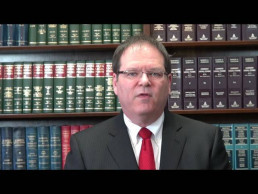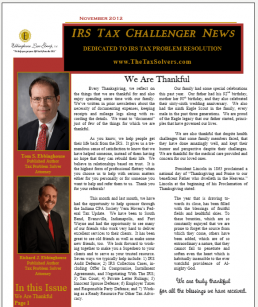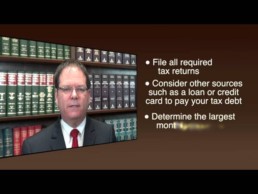Recordkeeping Tips for Freelancers and Gig Workers So You Can Avoid Getting in Tax Trouble
If you are working as a freelancer or gig worker, you are certainly not alone. Millions of men and women are earning extra income driving for ride sharing services, designing websites for online entrepreneurs and writing for local businesses.
Some freelancers and gig workers have even said goodbye to their traditional careers, trading the security of a steady paycheck for the freedom and flexibility of gig work and freelance clients. But whether you are freelancing full time or just for extra cash, you need to keep careful records so come tax time, you can stay out of tax trouble.
Note: If you fall behind on filing your taxes, you’re not alone and we can help. Reach out to our tax resolution firm and we’ll help you file late tax returns and negotiate with the IRS if you owe back taxes.
Set Up a Separate Bank Account
Freelancers and gig workers play many roles but they all have one thing in common, they are also business owners.
Whether or not you have incorporated your business or formed a formal business, you do operate your own business. That means you need a separate bank account to collect your earnings and pay your expenses.
If you have not already done so, you should set up a separate bank account for your freelancing income. If you do have a formal business structure and an employer identification number (EIN), you can use that information to open the account. If not, you can simply open a second account to collect your payments and take care of any business-related expenses.
Print Reports from Payment Providers
Gig workers and freelancers are paid in many different ways, from direct payments from clients to automated clearinghouse (ACH) transfers to their bank accounts. These independent workers may also receive payment through third party apps like Paypal, Stripe and Payoneer, and keeping it all straight can be a real challenge.
Luckily many of the major payment providers make it easy to find out exactly how much their members received during a given time period. If you want to see where you stand, and how much tax you might owe, sign on and print out a payment report from every provider you receive income from.
You can fill out those reports with your own carefully kept records, including documentation of direct client payments and bank transfers. If you are unsure how much you have received via ACH, you can check with your bank or request a written report.
Signing up for a bookkeeping service or bookkeeping software can also help keep track of all your income and expenses.
Maintain Contact Information for Everyone You Have Worked For
During the course of a single year, freelancers and gig workers may work for dozens of individuals and companies, and they may receive payments from just as many sources. In a perfect world, everyone who hires those freelancers and gig workers would maintain their own records and send out 1099s for tax purposes, but that is far from guaranteed.
If you want to avoid unpleasant entanglements with the IRS, you need to keep your own records and check off each 1099 as it comes in. If you earned income from a client and do not receive a 1099, it is your responsibility to follow up and get the proper paperwork, so make your life easier and keep contact information from everyone you worked for, even if they were only a one-time client.
Keep a Running Tally with a Spreadsheet
It can be hard to track your income from freelance jobs and gig work, but a spreadsheet will make it easier. If you want to avoid underreporting your income and the tax penalties that could bring, set up a spreadsheet and record every dollar you earn from your freelancing and gig work efforts.
Keeping a running tally of your freelance and gig work income serves a number of different purposes. For one thing, it will help you determine the amount of your required quarterly income tax payments, so you do not overpay or underpay what you owe. Tallying your income as you go can also help you see how you are doing, making it easier to ramp up your freelancing and gig work efforts as you go.
Measure, Photograph and Document Your Home Office
As a freelancer or gig worker, you may be eligible for some generous income tax deductions, including a write-off for your home office. If you operate your freelancing business out of your home or find gig clients there, you may be able to deduct part of your utility bills, rent or mortgage and other applicable expenses.
Not just any space will do if you want to take the home office deduction, and proper documentation could be the difference between a valid deduction and a disallowed one. You must use your home office solely for your business, and it is important to keep careful records to avoid problems with the IRS.
That means measuring the space your home office occupies, so you can compare it to the total square footage of your home. It also means photographing the space, so you can show those images to the IRS if they question the deduction.
Scan Receipts to Make Tax Deductions Easier
You may also be eligible for additional tax deductions, including write-offs for office supplies, internet access and the like. But you will need to back up those deductions if the IRS comes calling, so make sure you have all those receipts on hand.
A shoebox full of paper receipts will not do, so make sure you scan or photograph those documents and keep them in a safe place. (Some receipts due to the paper used turns dark over time and can’t be read - Take That Photograph!) That could mean setting up a folder on your hard drive (with a backup plan in place), uploading the images to the cloud or a combination approach designed to safeguard records of your business-related purchases.
Life as a freelancer or gig worker can be wonderful, but keeping proper records is essential. From making tax planning easier and less stressful to saving you money, there are many advantages to keeping careful records.
If you do run into tax trouble, reach out to our tax resolution firm and we’ll schedule a confidential consultation to explain your options in full to permanently resolve your tax problem.
9 Common Mistakes First Time Tax Filers Make That Can Land You In Tax Trouble
Being an adult has its perks, from being able to rent a car and book a hotel room to the chance to earn a living and rent an apartment. But life as an adult also comes with some challenges, including the burden of filing and paying taxes.
If this year is the first time you will be filing a tax return, it is important to plan ahead. Mistakes are common among first-time filers, and those blunders could delay a much-anticipated refund or even trigger an audit from the IRS.
Here are 9 of the mistakes first-time filers are likely to make - and how you can avoid them.
Note: If you or someone you know owes back taxes, our firm can help negotiate with the IRS and potentially settle your tax debt. Call us today. Our tax resolution team can navigate the IRS maze so that you have nothing to worry about.
1. Forgetting to file
When filing taxes is new, it is easy to forget to do it. Forgetting to file is a big risk for first-time filers, one that could have long-lasting implications for your adult life.
2. Not reporting all your income
As a first-time filer, it is easy to forget to report all your income, especially if you work a side hustle or participate in the gig economy. Failing to report all your income is a big no-no, and this mistake could trigger a visit from the IRS.
3. Not tracking the cost basis of your investments
If you invest in stocks, bonds or mutual funds, you may owe capital gains tax when you sell, so it is important to track the cost basis (how much you paid and any cost for purchase such as broker’s fees) as you go along. If you fail to track the cost basis, you could end up overpaying taxes on any future sales.
4. Paying for a refund anticipation loan
As a first-time filer, you are probably anxious for your refund, but paying to get it could be a big mistake. Unless you are in dire need, it is better to wait the 7-10 days for your e-filed return to be processed and your direct deposit to land in your bank account.
5. Choosing the wrong filing status
If you choose the wrong filing status, your return could be delayed, or even rejected outright.
6. Not asking your parents if they are claiming you on their tax return.
If your parents are still providing support for you, they may be able to claim you as a dependent when they file their taxes. If you incorrectly claim yourself as a dependent in this situation, you could be in trouble with the IRS. Even more importantly, you could land your parents in hot water as well.
7. Failing to claim all your deductions
From student loan payments to mortgage interest, the IRS provides a wealth of deductions that can reduce taxes for first-time filers. Failing to claim those available deductions is like leaving money on the table.
8. Waiting until the last minute
Many first-time filers assume that their returns will be simple, and that they can wait until the last minute to file. If you wait until April 15, you will be at the mercy of everything from closed post offices to a failed internet connection, so start early and get this chore out of the way as soon as possible.
9. Not planning for next year
When you are neck deep in tax paperwork, it is hard to see ahead, but failing to plan for future taxes is a big first-time filer mistake. Now that your return has been filed, do some homework on additional tax deductions, including those for 401(k) and IRA contributions.
The April 15 tax filing deadline will be here before you know it, and when it is over you will have officially become a taxpayer. If you want your first foray into taxpayer status to be a successful one, avoiding the 9 mistakes listed above is a good place to start.
If you know you’ll have outstanding tax debt and owe more than $10k to the IRS or state but can’t pay in full, contact our firm today. We help people find tax relief and sometimes settle their tax debt for a fraction of what’s owed.
Lucky Day at the Casino? Don't Forget About the IRS
Whether you gamble all the time or only once in a blue moon, you are filled with hope and excitement every time you walk through those casino doors. If you have been gambling for even a little while, you already know that Lady Luck can be a fickle partner. Sometimes the gods of the casino smile upon you, and other times they turn their back. So, when you finally hit the jackpot, you are overjoyed and brimming with excitement…
At least until you consider the tax consequences of your good fortune.
Every time you walk through the doors of the casino, Uncle Sam is peering over your shoulder, and the IRS will be waiting with its hand out when good fortune finally smiles on you.
So, as you celebrate your big win, do not forget about your taxes; if you do, the IRS is sure to come calling. If you have any tax issues or find yourself owing a large amount in back taxes, reach out to our tax resolution firm and we’ll help you navigate any obstacles.
Ask About a W2-G
One of the first things you need to know about winning big at the casino is that the IRS will receive notice of how much you won. If you try to fudge the numbers or not report the win at all, chances are you will soon be on the wrong end of a tax bill.
It is important to report all of your gambling winnings, even smaller jackpots that may not warrant a W2-G, the form on which those monies are recorded. And if you do win a substantial jackpot, ask the casino workers about how and when the tax forms will be issued.
Understand Withholding
When you have a lucky day at the casino, it is easy to blow your winnings, especially if you have never been so lucky before. But before you spend your last dollar, you might want to keep some in reserve for when tax time rolls around. If you fail to keep that money available, you could be in for an unpleasant surprise, and a big tax bill, when you file.
Casinos know that their customers may have trouble paying taxes on their winnings, and that is why many of them will automatically withhold a portion of the jackpot. If you do win a substantial jackpot, make sure you understand whether, and how, this withholding will take place.
If you are concerned about having the money to pay the taxes due, you may be able to ask the casino to do the withholding for you. Not all casinos will be willing to do this, but it never hurts to ask.
Track Your Losses
The fact that you have to pay taxes on your gambling winnings may seem unfair and arbitrary, but the IRS is not entirely heartless. You may be able to write off some of the money you lost in the pursuit of your latest jackpot, but only if you can back up those numbers with hard data. If you are going to try to offset your winnings with losses, you need to know the rules upfront, so that you can keep the proper records.
Tracking your losses is never a fun thing to do, especially if you are a regular casino visitor. Even so, it is important to keep track, and many casinos will do the work for you.
If you carry a casino loyalty card, you may be able to log on or request a report showing how much you spent, and how much you won, while your card was in use. This is not a perfect solution, but it can be a good first step if you plan to write off your losses in hopes of reducing your final tax bill.
Having a lucky day at the casino feels good no matter who you are, as does leaving the casino with a stack of cash and a big jackpot to your name.
But the next time Lady Luck smiles on you, make sure you leave a little for Uncle Sam.
If you find yourself behind on your taxes and owe more than $10,000, contact our firm. We’ll schedule a no-obligation confidential consultation to explain your options to potentially settle your tax debt for less than what you owe.
Made a Mistake On Your Tax Return? Here’s What To Do.
Tax returns can be complicated and tricky to understand. Even for a professional, it can be surprisingly difficult to get every number and detail right.
Often, you only notice the mistakes when you take a casual look at your return days after you submit it online or drop it in the mailbox. Or worse, the IRS sends you a letter telling you something is off.
So, is there anything that you can do after your return is in?
Actually, there's a lot that you can do. But if you don’t know where to start, it’s best to leave it to a professional. Our tax resolution specialists can navigate the IRS maze so that you have nothing to worry about. We help people who owe back taxes or have back tax debt. Call us today for a free consultation.
3 Major Types Of Mistakes
There are many red flags the IRS looks for on each tax return, but here are 3 common ones taxpayers make.
1: Not reporting all your income. No matter how much or little you make, report everything. In some way or another, unless you run a strict cash business (another red flag), all of your income is reported to the IRS. W2, 1099 and other forms you receive are duplicated and sent to the IRS. If your reported income doesn't match theirs, that's a red flag.
2: Overstating business expenses. Depending on the type of job you have, there can be many legitimate expenses that your employer doesn't reimburse you for. If you’re a business, you might be tempted to write off just a little extra. These might be genuine deductions. But don't try to deduct something that's not on the approved list and don't claim deductions way outside the norm. Check with your tax professional and stay up to date with tax laws so you’re not padding your tax return with write-offs.
3: Math errors. Whether you file electronically or still file paper forms, your information gets entered into a computer. And one thing computers are very good at is doing math. If things don’t add up, or there was an honest mistake in inputting the information, it can raise a red flag. A math error won't necessarily get you an audit, but it will get the attention you may not want. Make sure to double-check your returns and have a qualified tax professional assist you and keep you out of tax trouble.
Filing an Amended Return - The 1040X
Individual income tax returns filed with the IRS can be amended up to three years after the due date of the original return by filing IRS Form 1040X.
On a 1040X form, the IRS only asks to be shown what was originally filed, what the corrected details are, and the reason why you need to make changes. The form also includes a section where you get to change the personal exemptions that you've claimed on your tax return -- just in case you make a mistake listing your dependents.
A few tips on filing your 1040X form
● For each year that you need to make corrections for, you need to use a separate 1040X form and mail it in, in its own envelope.
● Each form should have the return year mentioned at the top.
● On the back of the form, you need to explain the changes you've made and your reasons for them.
● Any schedules, forms, or anything else that is affected by your change needs to be sent in with the form.
● If the corrections made to your federal form affect your state taxes, you need to send in a corrected return for that as well.
However, we strongly suggest consulting a tax resolution professional to help with your amended return. They can often file multiple years of unfiled tax returns, help you settle for a fraction of what you owe, and at the very least save you a headache.
You Have 3 Years
Many tax filers only notice a mistake on a tax return only when they look at it preparing their taxes the following year. Mistakes may come to their attention in one of several ways. They may share something with their tax preparer that they may have neglected to mention in the previous year. The tax preparer, then, may notice the need for amendments to a previous year's return, as well.
There is no set time period within which you must correct your return. You can do it any time you notice it. A general rule that the IRS follows, though, is to entertain corrections for 3 years after an original return is filed.
The 1040X is a paper-only form
Even if you always e-file your tax returns, you'll need to file the 1040X form as a physical, paper form. The IRS still isn't equipped to handle the 1040X form electronically. You also need to pay attention to where you mail it in - 1040X forms do not go to the same IRS service center address as regular returns.
If Correcting Your Mistake Results In More Taxes Owed, You Should Still Amend Your Return
If your tax return contains a mistake that shortchanges the IRS in a more serious way, chances are good that the IRS will discover it. For instance, if you made money off a freelancing job that you didn't file a 1099 form for, the IRS could find out and you could end up paying serious penalties besides the tax owed. If you catch it yourself, you'll save on penalties.
If you know you’ll have outstanding tax debt and owe more than $10k to the IRS or state but can’t pay in full, contact our firm today. We help people find tax relief and sometimes settle their tax debt for a fraction of what’s owed.
How Long Does It Take to Resolve An IRS Tax Problem of Unpaid Taxes?
One of the biggest, most common questions we receive here at our office is, "How long does it take to resolve an IRS problem of unpaid taxes?
We understand your pain and realize an "average" tax case is never the situation. At Ebbinghouse Law Group, we perform a thorough IRS investigation to better understand your tax situation in order to provide you with the best service possible.
Click to watch this video on "How Long Does It Take"
Call our office today to find out more on how we can help you resolve your case.
Ebbinghouse Law Group, LLC
320 N. Meridian Street
Suite 908
Indianapolis, IN 46204
p: 317-635-4010
What You Need To Know About Filing Past Tax Returns
Filing taxes can be time consuming and difficult, which is why many people fail to file on time. One of the most common questions that we hear from our clients is “What should I do if I haven’t filed past tax returns?” This is an important matter, so it is critical that you understand every aspect in detail.
There are serious consequences to not filing a tax return, which is why it is critical that any unfiled taxes be submitted as soon as possible, while making sure to include any deductions and benefits of that year that apply to you. It would also be in your best interests to hire an experienced tax attorney to help you avoid the following penalties:
• The IRS can impose a “failure to file” penalty that can increase your tax bill by as much as 25%
• The IRS can impose additional interest charges on money that is owed
• You can lose your tax refund even if you were supposed to get money back
• The IRS can seize your wages, bank accounts, and other assets to collect the money owed
• Criminal prosecution
To learn more about what you should do if you fail to file on time, watch the video below above.
Because taxes can be a complicated process, we understand the many reasons that a lot of people fail to file. However, whether you’re missing records, are afraid that you might owe back taxes, or are confused about how to fill out the forms, it is crucial that you contact an experienced tax attorney as soon as possible.
Ebbinghouse Law Group, LLC
320 N. Meridian Street
Suite 908
Indianapolis, IN 46204
317-635-4010
https://www.thetaxsolvers.com
What You Need to Know About IRS Penalties and Interests
Paying taxes is an inevitable cost for any business, and it is a chore that most business owners take in stride. However, when your tax bill arrives with penalties and interest tacked on to the total, it is difficult to swallow, because these fees unnecessarily increase your bottom line.
Most penalties and interest can be avoided, however, with just a little forethought. When it comes to taxes, you may want to employ the assistance of an accountant and attorney who understands the ins and outs of the system.
To learn more about how to avoid penalties and interest, watch the video above.
Not filing or paying your taxes on time is a very serious offense against the IRS. In order to avoid interest or penalties, you want to be sure to file and pay your taxes on time, in full. Even paying your taxes a little bit at a time you can accrue high interest rates, and late penalties could possibly be added to your due total.
If you file your taxes after the due date, things can become even more complicated and expensive than necessary. It is best to avoid this situation by filing and paying all of your taxes on time, but even the best laid plans can falter. If you find yourself in a position where you owe penalties or interest, an experienced attorney may be able to help you.
Legal counsel can help you fill out all the tax forms and provide knowledge of the law to help you avoid financial disaster, and can quite possibly help you lower the costs.
Contact an experienced attorney today for help with your tax needs.
Ebbinghouse Law Group, LLC
320 N. Meridian Street
Suite 908
Indianapolis, IN 46204
317-635-4010
https://www.thetaxsolvers.com
Can I Pay Back My Taxes with an Installment Plan?
Knowing that you’re in debt can cause a lot of stress and worry in your life, and this is particularly true if you owe back taxes to the IRS. One of the most common questions we get from our clients is, “If I can’t pay my taxes right now, what are my options?”
Because not paying your taxes is a very serious offense, it is important that you understand all of your options for paying back the IRS.
To learn more about what to do if you fall behind on your taxes, click the link to watch the video below.
Whether or not you can afford to pay your taxes on time, you are still obligated to pay the IRS. Fortunately, the IRS offers ways to help you relieve the debt a bit. They offer monthly installment plans, and may be even willing to accept a settlement for less than or a fraction of the amount that you owe.
Before you apply for a monthly installment plan, however, there are steps that you should take to be sure that you have made the right decision, such as:
• File all required tax returns
• Consider other sources, such as a loan or credit card, to pay your taxes back in full, and possibly save money this way
• Determine the largest monthly payment that you can make (The IRS has a $25 minimum)
You must also understand that all future refunds will be applied to your tax debt as well, until your debt is paid in full.
An experienced tax attorney can help you negotiate with the IRS, come up with the best solution for your unique circumstances, and possibly save you thousands of dollars. For the help of a seasoned tax attorney today, call Ebbinghouse Law Group at the number below.
Ebbinghouse Law Group, LLC
320 N. Meridian Street
Suite 908
Indianapolis, IN 46204
317-635-4010
https://www.thetaxsolvers.com










